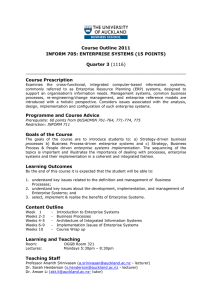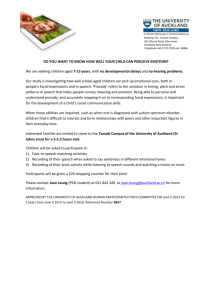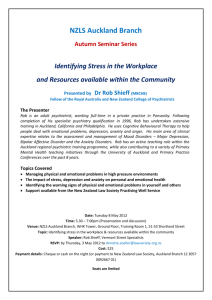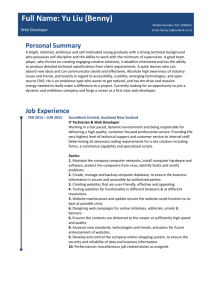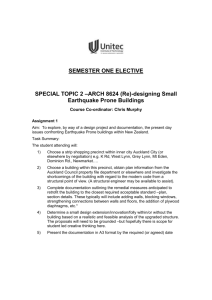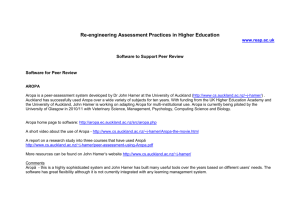> Crane Rates Soaring Top Class Lashing Happy Anniversary Containerisation NZ
advertisement
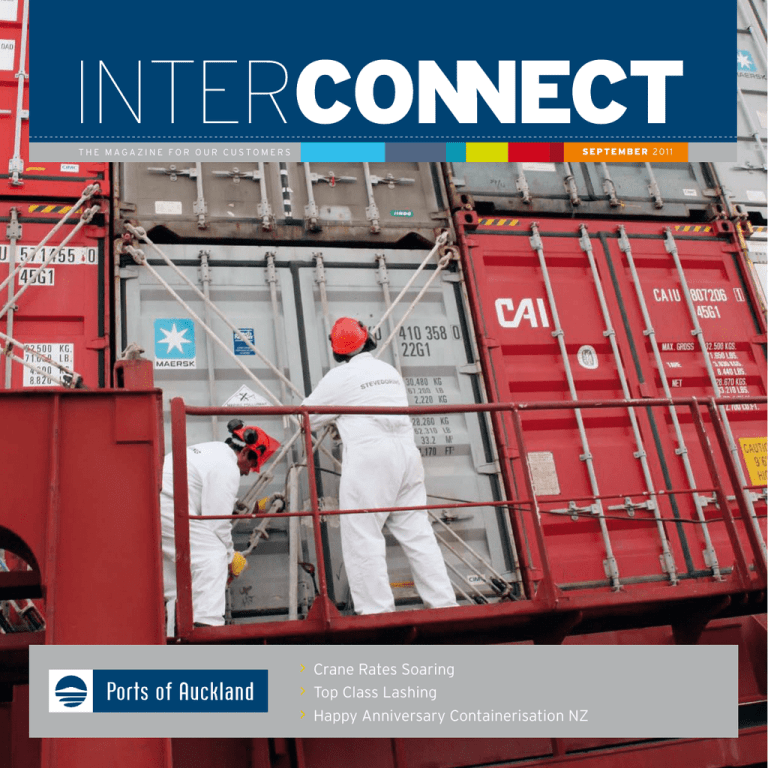
THE MAGAZINE FOR OUR CUSTOMERS September 2011 > Crane Rates Soaring > Top Class Lashing > Happy Anniversary Containerisation NZ Contents 2-3 POAL FOCUS 4-5 OPERATIONS REVIEW 6-7 POAL NEWS New developments around the port Crane rates up for productivity boost Craig Sain General Manager Sales, Marketing and Logistics, PORTS OF AUCKLAND 8-9 HAPPY ANNIVERSARY CONTAINERISATION Hamburg Sud & POAL celebrate 10-11 KOTAHI – Fonterra & Silver Ferns Cargo Consortium 12-13 14-15 LASHING POAL scores best in lash class MARKET ROUND UP BACK PAGE DIRECTORY SEPTEMBER 2011 POAL FOCUS The 2010/11 financial year was a challenging one for Ports of Auckland but, as the country began to put the global recession behind it, some positive signs emerged. In this context, container volumes were up a pleasing 3.4%, with full import volumes and full export volumes up by over 5% compared to 2009/10. Assisted by a strong New Zealand dollar, import volumes returned to a more natural volume profile during the latter half of the financial year. At the same time we were able to maintain import dwell times at less than two days, allowing cargo to reach the market quicker than in previous years. The growth in full export volumes, off the back of an excellent dairy season, was particularly encouraging for Ports of Auckland. The trend towards greater hubbing and trans-shipment of cargo continued, with volumes up by 7% on 2009/10, the key driver being the consolidation of lines’ services into Vessel Sharing arrangements (VSAs), enabling greater ‘inter-service’ connectivity for the Lines. Looking forward, we believe the Fonterra seafreight tender and the creation of Kotahi Logistics (see pg 10 & 11) will have a sizeable impact on volumes through Ports of Auckland. It is too early to be definitive about the effect of these developments. However, if the revamping of Maersk’s mainline and feeder services and the introduction of the CMA-CGM ANZEX (see pg 5) service are anything to go by, it is safe to say that the changes to shipping services are dramatic. Overall, we believe that greater collaboration among supply chain players has to be good for New Zealand. If Kotahi is successful, it has the potential to create significant supply chain efficiencies. Clearly we are operating within a period of volatility in terms of shipping services, schedules, berth windows and port rotations. However, Ports of Auckland is viewing the future with renewed confidence, especially given the significant improvements in berth productivity that we have been able to achieve recently. We remain committed to further improving our performance. The past year saw a continued focus on InterACT, developing CONLINXX and the Wiri Freight Hub, and on optimising the supply chain between Wiri and the seaport. We also continued our drive to improve our business processes, and will continue to PORTS OF AUCKLAND FERGUSSON, FREYBERG, JELLICO AND BLEDISLOE WHARVES work with customers to eliminate productivity barriers such as late cargoes, containers without CEDOs and changes in status of boxes once received. Linked to these initiatives is the planned introduction of our new paperless gate process and Container Booking System (CBS). Following the formation of our new shareholder, Auckland Council Investments Limited (ACIL), we have recently completed a three-year strategic plan, with an emphasis on lifting returns, enhancing productivity and achieving improved labour flexibility and utilisation. Following a staff competition, we have also developed a new Company Vision: Working for Auckland – Kia Kaha, Kia Maia (Give of your best, be confident in your ability). The new strategy and company Vision aren’t about delivering quick wins – our focus is on building a winning culture and the long-term financial performance required to fund further expansion and capital investment at the Auckland seaport – for the benefit of our customers and the region. With this in mind, a range of initiatives designed to strengthen leadership and employee engagement is being implemented, including a major process mapping exercise and organisational redesign, scheduled for completion by the end of 2011. We are now looking forward to a healthy pre-Christmas peak import season, off the back of the 2011 Rugby World Cup and the 2011 Triathlon World Champs. As well as delivering significant economic benefits to the city and region, these flagship events will help to reinvigorate the Auckland waterfront. We are delighted to be part of the action. 3 OPERATIONS REVIEW: While 2010/11 was a challenging year for POAL operationally, it ended on a high note with all time best crane rates recorded in the June quarter, up 4.1% on the previous best quarter. Overall, crane rates were up 2.4% on 2009/10. “Other key factors included the freeing up of As part of its commitment to achieving further gains space by the demolition of the SeaPack shed and in productivity, POAL is measuring its performance expansion of the Fergusson empty container depot. against the Australian Waterline Standard, as part These moves have freed up space in the yard and of a new Ministry of Transport study to benchmark enabled us to significantly improve yard planning productivity at all the container ports in Australia and utilisation.” Nevertheless, yard utilisation at and New Zealand. Mr Hulme says POAL is pleased POAL remains high compared to many other ports, to see greater transparency over productivity which is why the good results are particularly measures. “It will be great to be able to benchmark pleasing, Mr Hulme says. “Our high level of yard utilisation means straddles need to navigate through a large number of stacks to reach their destination, increasing the time taken to move a box.” Another key driver behind enhanced productivity at the port has been the Sattel safety and productivity Stevedoring Manager Jonathan Hulme says crane rates benefited from a substantial increase in the proportion of containers being twin-lifted and the recruitment of additional straddle drivers and lashers. system, which was introduced a year ago on POAL’s Over the past two years, POAL has doubled its twin-lifting ratio across the berth and in the yard. This has meant that POAL typically twin-lifts 50% of all containers across the berth and 20% of all containers in the yard. SEPTEMBER 2011 43 straddle carriers. “Thanks to Sattel, we’ve had a 90% reduction in our performance against comparable ports in New Zealand and Australia.” POAL publicly released actual crane rates for the first time this year, with data showing that under the Waterline Standard, crane rates at POAL improved from 23.47 in 2007 to 26.31 in 2011. Mr Hulme cautions that crane rates are purely a measure of speed, rather than productivity, and need to be considered alongside a range of other measures. “Over the same time period POAL’s staff hours per container have decreased 16% – this is probably a damage costs – to straddles and to containers. better reflection of how productivity has improved at We’ve also achieved a sustained 6% boost in the port over the last five years. We anticipate further straddle driver productivity – in terms of moves productivity gains over 2011/12 with strong results in per hour – over the last six months. The monthly July and August getting the new financial year off to results are conveyed to drivers individually, with the a good start. For us the key is consistency – while we top 10 performers congratulated and thanked. We have always been able to deliver some good individual also consult with the high performers using their results on particular ships, we want to ensure we can feedback to see how we can do things better.” deliver top results day in, day out,” Mr Hulme says. AUCKLAND FIRST NZ CALL FOR ANZEX Ports of Auckland was the first New Zealand port call on 14 August for CMA CGM’s new Asia/ NZ service. This commenced with the 2,200 TEU Hansa Meersburg – one of seven ships in the weekly service that links Asia, Fiji, New Zealand and Noumea. The ANZEX rotation is Port Kelang, Chiwan, Shanghai, Pusan, Suva, Auckland, Port Chalmers, Lyttelton, Tauranga, Noumea, Port Kelang. On the same day as it announced the new service with its ‘advanced reefer capacity’, CMA CGM also released details of a new strategic relationship with the newly formed Kotahi Logistics – a freight management partnership between NZ’s largest dairy and meat exporters – Fonterra and Silver Ferns Farms. CMA CGM says ANZEX will operate the fastest transit times on the Asia/NZ trade with 17 days Shanghai/Auckland and 16 days Tauranga/Port Kelang. CMA CGM Hansa Meersburg Highlights for Multi-Cargo and Marine over the final quarter included the continued strength of the vehicle trade, finalising planning for Rugby World Cup 2011 (RWC 2011) and the Venus upgrade, which was covered in last quarter’s Interconnect. General Manager Multi-Cargo and Marine Wayne Mills says strong growth in bulk volumes is continuing through into the new financial year. “While we expect the vehicle trade to be challenging given the effect of the Japanese tsunami and the new emissions rule, the team is looking forward to a recordbreaking cruise season and all the excitement of the special RWC 2011 charter cruise ships being in town.” 5 POAL NEWS: Shipping containers are key features of the recently redeveloped Auckland waterfront Wynyard Quarter. SEPTEMBER 2011 Located on former Ports of Auckland land, the new area includes a POAL sponsored information kiosk that will be a hub for visitors and community activity. The kiosk features historical and current information about the Auckland waterfront, including a live feed and video footage of port operations. Other key features of Wynyard Quarter include: Wynyard Crossing – an opening bridge accommodating pedestrian and cycling access between Te Wero Island on Auckland Viaduct and the Wynyard Quarter. Viaduct Events Centre – a new 6000m2 events facility on Halsey Street Extension Wharf. Jellicoe Street – a 440m tree-lined, blue-stone paved public boulevard incorporating a tramline, public seating, lighting, rain-gardens and sculpture. North Wharf – nine new restaurants and bars at the water’s edge. Silo Park – a grassed public space bordered by a 12 metre high, 110 metre long steel gantry, celebrating the area’s industrial heritage and incorporating a Golden Bay Cement Silo and ‘six-pack’ with excellent views over the area. Auckland Tramway – a new 1.5km tramway loop carrying two historic trams – imported through Ports of Auckland – painted in the original carnation red livery. Ports of Auckland Supports Opening Night World Cup Ports of Auckland is an official supporter of the 2011 Rugby World Cup Grand Opening Night in Auckland on 9 September. Huge screens and a programme of events around the waterfront will celebrate the kick-off as the Rugby World Cup 2011 gets underway at Eden Park in Auckland. Free entertainment, including headline act NZ’s very own Finn Brothers, starts at 4pm and includes the largest fireworks display ever seen in New Zealand. 2011 Triathlon World Cup POAL is supporting the 2011 Triathlon World Cup, which is being held on the Auckland waterfront on Sunday 20 November. This unique event, delivered by Triathlon New Zealand, will see a field of the world’s best elite triathletes competing for Olympic qualifying points and will incorporate selection races for New Zealand’s top ‘weekend warriors’ to represent their country at the 2012 World Championships. The event transition area will be located just inside the Quay St Red Fence, between Queens Wharf and Captain Cook Wharf. Ports of Auckland Chief Executive Tony Gibson said the port is delighted to be able to help. “It’s great to see such a popular event on the Auckland waterfront and we’re excited at being able to help make it happen,” says Mr Gibson. “This is a great opportunity for Auckland and a natural fit with our own focus on fitness and wellbeing.” Waterfront Masterplan Consultation Towards the end of September Auckland Council will release the draft Auckland Plan, City Centre Plan and Waterfront Plan for public feedback and submissions. The Waterfront Plan in particular will be of interest to the industry, as it aims to guide the future development of the Auckland waterfront. Ports of Auckland is encouraging all parties with a commercial interest in the waterfront to make a submission and will be in contact closer to the time with further details. New Chairman and Director for Ports of Auckland Richard Pearson has been appointed Chairman of Ports of Auckland, replacing John Lindsay who will step down from the Board at the end of 2011 after fifteen years service. Experienced company director Wayne Walden has been appointed as a director, replacing Peter Dunlop, who has resigned from the Board. Richard Pearson will be known to many in the industry from his extensive experience in port operations and investment around the world. He has recently returned to New Zealand following a long career with Hutchison Port Holdings Group, most recently as Managing Director, Hong Kong International Terminals Ltd (1996 – 1998) and Managing Director – Europe Division, President ECT Rotterdam (1998 – 2007). He is currently Chairman of Wellington Electricity Distribution Network Holdings Ltd. Wayne Walden was previously Managing Director and shareholder of Farmers/Deka Ltd. He has had more than 30 years senior management experience in the liquor, wholesale and retail trades in New Zealand. He is currently a Director of Television New Zealand Limited. POAL is a wholly owned subsidiary of Auckland Council Investments Limited (ACIL). The value of investments that ACIL owns and/or manages is approximately NZ$1.7 billion. In addition to the investment in POAL it owns 22.45% of Auckland International Airport Limited and 44% of Auckland Film Studios Limited. It also manages a diversified financial assets portfolio for the Council. RICHARD PEARSON 7 HAPPY ANNIVE CONTAINERISATI At dawn on 23 June 1971 Ports of Auckland made history as the first New Zealand port to host a containership. On that day forty years ago, the advent of containerisation in NZ would change the face of NZ ports and shipping forever and open the door to global competitiveness for NZ exports. SEPTEMBER 2011 The pioneer was Hamburg Sud, the established German-owned line that introduced containerisation to NZ under its Columbus Line brand. In June this year Hamburg Sud joined with Ports of Auckland (POAL) in celebrating the 40th anniversary of the arrival in Auckland of Columbus New Zealand on 23 June 1971. The first in a long line of distinctively red hulled vessels that plied the NZ trade, the Columbus New Zealand was the first cellular container ship to come to NZ. It wasn’t however Hamburg Sud’s first appearance in NZ where the Line had been operating conventional shipping services to West Coast North America (WCNA) since 1961. “2011 therefore marks a double celebration for us – 40 years of running container services into NZ and 50 years as a Company in NZ”, Hamburg Sud NZ General Manager Commercial, Simon Edwards, told guests at a joint Ports of Auckland/Hamburg Sud anniversary celebration in Auckland recently. The 1,187 TEU Columbus New Zealand was one of three sisterships with Columbus America and Columbus Australia that Hamburg Sud had built specifically to meet the requirements of the NZ Meat Producer Board. With its 758 reefer capacity and an elaborate cooling system, the Columbus New Zealand’s pioneering service was from Auckland to East Coast North America (ECNA). Within a short time the service, with its primary meat customers, gained the additional support of the NZ Dairy Board for its North American shipments. Two years later in 1973 Hamburg Sud also containerised its WCNA service. Since then POAL and Hamburg Sud have maintained a close working relationship in which both companies have advanced and expanded. For Hamburg Sud, both the size of vessels and the number and frequency of its container services has increased considerably. Hamburg Sud vessels calling NZ ports today are in the 3,500-3,700 TEU range operating services between NZ, North America, North and South Asia and the Pacific Islands. At POAL the advances since 1971 are epic: from one twin-lift portainer crane that (with the help of the ship’s deck-mounted crane) took one and a half days to unload 174 containers from Columbus New Zealand and to load 168 export containers, POAL today would complete an exchange on the same vessel in just six hours using just two of its eight hi-tech cranes. Today Hamburg Sud operates 40 container liner services around the world where it deploys over 100 container ships and owns 400,000 containers. The largest vessels in its containership fleet are now over 7,000 TEU. Today Ports of Auckland handles some 900,000 TEU each year which accounts for 85% of all the cargo handled at the port. ERSARY ION NZ! Tony Gibson CEO POAL & Simon Edwards HSD GM Commercial Hamburg Sud Team Tony Gibson (centre) with Eric Temple, Rob Powley, Joyce Haynes & Ian Cassidy, all of whom were working at the port when the first container ship came in Richard Pearson (Chairman, POAL), Tony Gibson & Simon Edwards 9 Kotahi In a first for NZ, the country’s largest dairy and meat exporters have formed a freight management company to ‘improve efficiencies in the supply chain’. Kotahi – ‘Standing Together As One’, is a partnership between co-operatives Fonterra and Silver Fern Farms who have combined exports of 175,000 TEU pa equating to one third of all containers leaving NZ – many of which pass through the Ports of Auckland. NZ Shipping Gazette Columnist Dave MacIntyre examines the aim of the exercise and its implications for the ports and shipping industry. SEPTEMBER 2011 Friend or foe? … The jury is out on the impact that Kotahi will have on the New Zealand supply chain, on shipping services, on ports and on logistics providers — and the viewpoint taken may well depend on whether the observer is a service provider or an exporter. Put simply, many shipping lines and rail and road operators fear an increasing squeeze on their margins while exporters (some at least) are hoping to jump on the bandwagon created by the new export-import freight management company put in place by the giant dairy and meat exporters Fonterra and Silver Fern Farms. The equation is more complex than that, but Kotahi’s aims reflect its power as a negotiating block which, in New Zealand terms, is unequalled. Fonterra alone was a huge presence in the shipping world and by adding the volumes of a significant meat shipper, Kotahi will control about one-third of the export boxes that leave NZ, worth a value of NZ$400 million. That can only get bigger as other exporters join in, allowing Kotahi to do the negotiating and manage the freight arrangements for all members. The consortium has made it clear it wants to pull in other exporters from other complementary fields, such as seafood and the fruit and vegetable sectors. Covering all bases, Kotahi is in fact seeking Commerce Commission approval for collaborative deals with ocean carriers. It would be ironic if the commission decides to lift the current exemption from competition law enjoyed by international seafreight, but Kotahi will argue collaboration among shippers is for the greater good of ‘NZ Inc’. This leads to the obvious conclusion that Kotahi will be able to command volume discounts beyond anything its individual members could do alone. In its initial stages, the expectations of the market are certainly that rates will be under the microscope as Kotahi flexes its muscles. However, there is a limit to wringing lower rates out of ocean carriers and the like, particularly when one considers there is no ‘new’ cargo on offer from Kotahi – it is simply bringing together existing lumps of cargo and ‘Standing Together As One’ putting them into greater parcels. Of course, that consolidation in itself has powerful appeal. Sooner rather than later, therefore, Kotahi will doubtless wield a wider influence in the supply chain and on all aspects from shipping services, port calls, inland transportation patterns to port development strategies. On this front Kotahi showed its colours from the outset with the formation of a ‘strategic relationship’ with the coincidentally announced new CMA CGM ANZEX service, a fixed-day weekly direct service between the Far East and New Zealand. Confirming the relationship in its official new service announcement, CMA CGM has met Kotahi’s preference to move dairy powder direct into Chinese ports as opposed to transhipment. The quid pro quo was a pay-off too for CMA CGM — it got a slice of the Fonterra cargo tender that allows it to now boost its own service offerings in NZ. It can build on that base cargo and aim to woo other shippers. That is just one example of the Kotahi shipping service shaping strategy, and the same could well be true of strategic development plans for ports. With Fonterra, Kotahi backs the aim of the NZ Shippers’ Council (NZSC) Big Ships concept, which wants vessels of 6000-7000 TEUs introduced to NZ trades to offer lower average slot costs to exporters. Such a scheme requires selected ports to invest in dredging to handle the vessels, cranes to work them and cargo marshalling areas for the exchanges. That NZSC target was set back in July with Maersk’s withdrawal of its NZ1 fleet of four 4,100 TEU vessels (the largest ever to serve NZ on a scheduled container service) which it has replaced with nine smaller 2,900 TEU vessels. Meanwhile if Kotahi does indeed want to see the Big Ships concept come to fruition, it is in a prime position to shape that future because it will control a major portion of the cargo being offered. Like Fonterra before, it can effectively indicate which ports it wants to see handle the main volumes, and it can negotiate with carriers, ports and rail to see its wishes acted upon. But these are early days: A lot more needs to be revealed about Kotahi, such as how it expects to be able to achieve its goal of smoothing out some of NZ’s seasonal highs and lows of export shipping demand for cargo space throughout the year, and what changes it will make to internal freight movements. There will be winners and losers from whatever changes it brings about. But one thing is certain – Kotahi is a significant initiative and its influence is set to be profound. Kotahi CEO Chris Greenough at the Kotahi launch party 11 LINES GET A GOOD PORTS OF AUCKLA Every year hundreds of sea containers are lost overboard or damaged during the voyage through movement. Besides the cost of the loss or damage, containers overboard often remain afloat for weeks presenting a serious collision risk. SEPTEMBER 2011 In recent times the number of containers lost overboard has reduced considerably according to a recent report by the World Shipping Council (WSC) which estimates that from highs of 10,000 box slips off ships per year, there are now less than 1,000 – perhaps as few as 700 slips per year. This achievement WSC attributes to significant improvement in container lashing standards. And it is in this crucial yet low profile area that Ports of Auckland has become a pacemaker in the lashing efficiency charge. Lashing is an integral part of the service that POAL provides its shipping line customers. In the stevedoring part of that service lashing would be rated by many as the most important element. That is because it is the lashing team that both initiates and completes the container exchange process. They therefore directly influence the time the ship is at the berth. Not only do the lashers influence the speed of the exchange, it is their efficient lashing techniques and processes that prevent lashing system failure, loss of cargo and decrease the risk of container damage due to movement during a voyage. Lashing is basically the process of securing containers together once they are loaded onboard ship and of releasing that security system on the ship’s arrival. Over time the process has been transformed in terms of both safety and effective, efficient lashing equipment which today includes solid metal lashing bars that hold the containers together and twistlocks that secure containers ondeck. A major exchange at POAL will typically engage multiple cranes with six lashers working beneath each crane. There are in fact 200 lashers at Ports of Auckland most of whom are fully trained to NZQA assessments standards in a lashing training programme introduced by POAL as a NZ ‘first’. POAL Senior Shift Manager Mike Kirwan says the high percentage of POAL’s stevedores who are lasher-trained reflects the High Priority status POAL gives to Lashing. “This is reflected in our unique training programme. Firstly it’s not carried out over an hour or two on the job onboard the ship. We put a lot of time into it: It’s a five day programme in a designated training area that enables practical but safe lasher technique demonstration and practice. The bonus is that while practice will invariably bring its OD LASHING AT AND share of mistakes, the mistakes are made away from the vessel unlike with on the job training. In the POAL approach, training and learning doesn’t affect berth productivity and it’s far safer. As a result we have a highly efficient, safety conscious lasher team with a very low rate of LTI (Lost Time Injury).” As he explains, this is not a job for the fainthearted or for wimps. “Lashing is rated heavy manual labour; those solid metal lashing bars take muscle power. While our customers are at home by the fire, the POAL lashers are out there battling the elements in often freezing cold, wet and windy conditions in a 24 hour operation that requires them to be first onboard to unlash to enable the cranes to begin unloading, and last to leave following securing of boxes before the ship departs.” At that point the lashers’ work is signed off by the ship’s Chief Officer. Mike Kirwan reports that POAL’s record for immediate lashing signoff is excellent: “And that’s very important because obviously the aim of the exchange exercise at POAL is to turn the ship round fast and efficiently and on time or, even better, ahead of schedule. It’s the POAL lashers who are an integral part of making that happen”. 13 MARKET ROUND UP: News & views on New Zealand shipping trades Recent shipping and related appointments include Theo Spierings as new CEO of NZ dairy co-operative Fonterra replacing Theo Spierings and service enhancements’. Carolyn Tremain has been appointed NZ Customs new Chief Executive and Comptroller from September. Her background includes senior management roles in public and private sectors most recently with the Inland Revenue Department. New appointments at Mitsui OSK Lines (MOL) include Mark Austin as Chairman and Managing Director for MOL Oceania. Previously MOL Director for Australia and NZ, Mark Austin succeeds Yasuhiro Nishioka. MOL NZ Country Director Malcolm Woods will report to Mark Austin who is based in Sydney. Andrew Ferrier. Theo Spierings has a 25 year history in the global dairy industry most recently with the Dutch dairy cooperative Royal Friesland Foods. Chris Greenough is the CEO for the newly formed Kotahi – a freight management partnership between NZ’s largest dairy and meat exporters, Fonterra and Silver Ferns Farms which have combined exports of some 175,000 TEU pa. After 17 years in mobile and fixed wire communications in marketing and distribution in NZ, UK, US and Europe, Chris Greenough joined Fonterra in 2008 to spearhead a strategic review of its ocean and land freight providers. He says others including NZ seafood and fruit exporters will be invited to participate in Kotahi where initial focus will be on ocean freight: ‘planning, buying and optimising SEPTEMBER 2011 weekly usage to drive greater efficiency Ports of Auckland gets an additional weekly call in Maersk’s new dual loop Northern Star/Southern Star service that replaces Maersk’s NZ1 schedule linking NZ, Europe and Asia. As the largest container ships on the NZ trade, the four NZ1 4,100 TEU ships have been replaced on the dual service by nine 2,900 TEU vessels. POAL customer ANL recently celebrated the 10th anniversary of its dedicated service between Australia and NZ. The Line marked the event by announcing a ‘major vessel upgrade’ on the TransTaz service where the 2,646 TEU ANL Benalla is replacing the smaller Ocean Bright. increase of 12% including a 7% increase in POAL Staff changes: cars carried. WWL says this reflects a faster Perry D’Souza has accepted an internal Long standing NZ shipping related than expected recovery in the Japanese car promotion and will be joining our Marine company Scales Corporation has withdrawn sector following the Japanese earthquake. Services team training as an Auckland ANL Benalla fixed and three hoistable decks. WWL has four of these RoRos on order from Mitsubishi, the second due for delivery August 2011 and two further next year. WWL which operates 127 vehicle carriers, reports a year-on-year freight volume from port agency work and closed the pilot. To enable Perry to take up this remaining Geo H. Scales offices in Auckland new role we are pleased to announce the temporary appointment of and Wellington. Scales is primarily involved In its move to introduce bookings now in horticulture and primary sector exclusively online, Maersk is upgrading processing, export logistics and cool storage. its www.maerskline.com website with Multi-Cargo Operations Supervisor. various enhancements including an online Ben has been with Ports of Auckland for resolutions tool. Maersk NZ’s Campaign many years and will be working closely Wilhelmsen Line’s newbuild, the and Commercial Manager Finn Jensen with Justin Maddock, Multi-Cargo MV Tonsberg, the largest and most says E-bookings in NZ for Maersk are Customer & Systems Support Manager, sophisticated RoRo vessel ever built, made already running at about 80%. The Line in looking after all things Multi-Cargo. its first call to Auckland recently on WWL’s expects that it will be accepting online Round The World service in which Ports of bookings only within 18 months. This is Auckland is NZ’s only port call. The mark V just one initiative in Maersk’s ‘New Normal Class ship is 265M long with a cargo volume Manifesto’ which also includes a container capacity of 138,000 cubic metres over six booking cancellation and compensation fee Ben Wilkinson to the position of programme being trialled in the USA over the next 12 months. Designed to reduce the average 30% no shows that Maersk suffers systemwide – ie, containers booked that don’t show up, this will be matched by equal Maersk compensation to shippers when and if the Line fails to ship the container as booked. Maersk has said that the fees will MV Tonsberg be around US$100 per dry box and US$500 Ben wilkinson per reefer container. 15 DIRECTORY www.poal.co.nz Tony Gibson CEO Ports of Auckland Limited DDI: 64 9 348 5284 Mob: 021 190 1070 Fax: 64 9 348 5005 Email: gibsont@poal.co.nz Richard Potton Manager, Sales, Marketing & Product Development DDI: 64 9 348 5249 Mob: 0274 484 473 Fax: 64 9 348 5076 Email: pottonr@poal.co.nz Craig Sain General Manager, Sales, Marketing & Logistics DDI: 64 9 348 5263 Mob: 021 934 452 Fax: 64 9 348 5076 Email: sainc@poal.co.nz Yvonne Theuerkauf Manager, Logistics DDI: 64 9 348 5369 Mob: 027 333 3154 Fax: 64 9 348 5005 Email: theuerkaufy@poal.co.nz Wayne Mills General Manager, Multi-Cargo & Marine DDI: 64 9 348 5266 Mob: 027 597 2390 Fax: 64 9 348 5005 Email: millsw@poal.co.nz Jon Ward Manager Operations Planning & Customer Services Container Terminals DDI: 64 9 348 5291 Mob: 021 982 683 Fax: 64 9 348 5005 Email: wardj@poal.co.nz Jonathan Hulme Manager, Stevedoring Container Terminals DDI: 64 9 348 5307 Mob: 027 207 7032 Fax: 64 9 348 5005 Email: hulmej@poal.co.nz Justin Maddock Multi-Cargo Customer & Systems Support Manager DDI: 64 9 348 5113 Mob: 027 667 7749 Fax: 64 9 367 5450 Email: maddockj@poal.co.nz Cranes working a vessel at Fergusson. POAL Customer Services DDI: 64 9 348 5100 Fax: 64 9 388 5087 Email: customerservice@poal.co.nz On the cover: Ports of Auckland Lashers at work. Interconnect is the magazine of POAL, Sunderland Street, PO Box 1281, Auckland, New Zealand. Tel 64 9 348 5000. Fax 64 9 348 5069. www.poal.co.nz Interconnect is published for customers of Ports of Auckland. If you would like to receive a copy on a regular basis, please contact Richard Potton, tel 64 9 348 5249 or email pottonr@poal.co.nz with mail address details.

